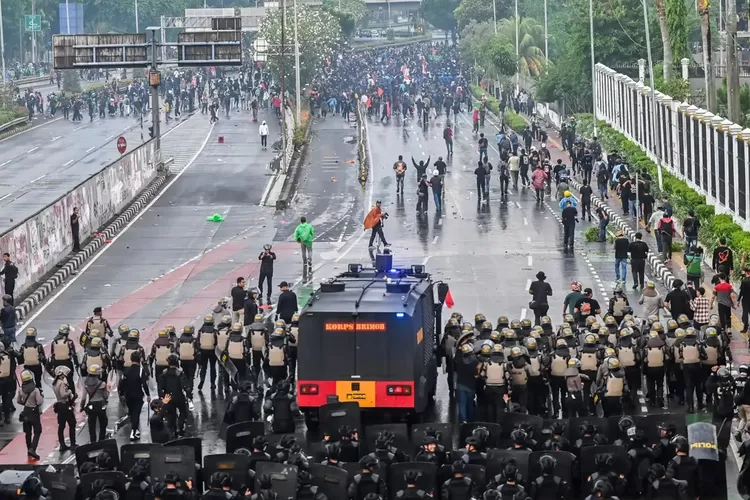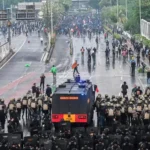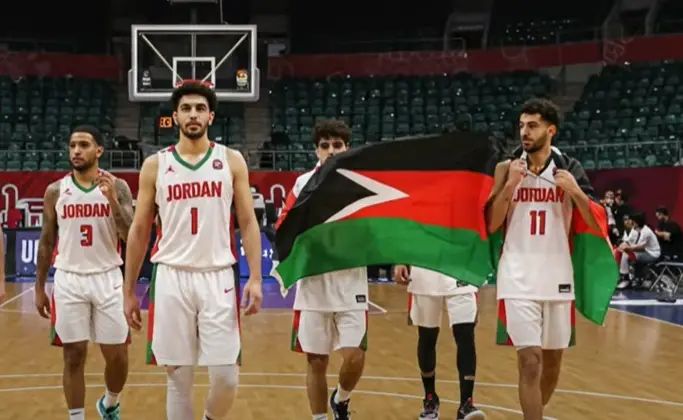A Renewed Momentum
The “17+8 Demands” movement originated in late August and has since become the shorthand for a comprehensive list of reforms aiming to address systemic issues ranging from institutional reform to economic hardship. On 4 September, proponents of the demands once again gathered at the seat of legislative power, delivering the full document to Gerindra Party’s Andre Rosiade and PDI-P’s Rieke Diah Pitaloka, who pledged to relay the demands to parliamentary leadership
Key Voices: “If Parliament Can Pass Law Overnight…”
Among the protest’s most quoted voices is Andovi da Lopez, a well-known influencer, who dismissed skepticism about the demands’ feasibility. He reminded critics that during last year’s local election law reform, lawmakers were able to revise the legislation overnight—implying that real political will makes rapid reform possible. His statement underscores the protesters’ conviction that their agenda isn’t unrealistic—it’s reachable.
The Demands Unpacked: A Dual-Track Strategy
The structure of the “17+8” nomenclature communicates urgency and strategy: seventeen immediate actions within a week, and eight broader, structural reforms to be completed within a year. The demands consolidate over two hundred proposals from civil society groups, labor unions, and public figures like Jerome Polin, Salsa Erwina, and Abigail Limuria.
17 Short-Term Demands (Deadline: 5 September 2025)
To President Prabowo Subianto
- Withdraw the TNI (Indonesian military) from civilian security duties and ensure demonstrators are not criminalized.
- Establish an independent investigative team into the cases of Affan Kurniawan, Umar Amarudin, and other victims from the 28–30 August protests—with a clear, transparent mandate.
To the People’s Representative Council (DPR)
- Freeze pay increases and benefits for DPR members; cancel new perks, including pensions.
- Regularly publish budget transparency—covering salaries, benefits, official residences, and DPR facilities.
- Urge the DPR’s Honorary Body to investigate corrupt or controversial members, including referrals to the Corruption Eradication Commission (KPK).
To Political Party Leaders
- Impose firm sanctions or expel party members in DPR who act unethically or provoke public outrage.
- Publicly declare commitment to support the people during crises.
- Engage party members in open dialogues with students and civil society.
To the Indonesian National Police (Polri)
- Release all detained protestors.
- Cease police violence and adhere to existing mass-control SOPs.
- Arrest and legally process officers and commanders transparently who were involved in violence or human rights violations.
To the Indonesian Military (TNI)
- Return to barracks immediately; cease involvement in civilian security tasks.
- Enforce internal discipline to prevent TNI from overtaking police functions.
- Issue a public commitment not to intervene in civil affairs during democratic crises.
To Economic Sector Ministries
- Ensure a living wage across all sectors—including teachers, laborers, healthcare workers, gig economy partners (e.g., ojol drivers), and others.
- Implement emergency measures to prevent mass layoffs and protect contract workers.
- Initiate dialogue with labor unions to resolve issues around regional minimum wages, contracts, and outsourcing.
8 Long-Term Demands (Deadline: 31 August 2026)
- Thorough DPR reform—conduct independent audits, raise entry standards (categorically excluding ex-corrupt figures), implement KPIs for performance, and eliminate lifelong pensions, special transport, escorts, and tax-funded privileges.
- Political party reform and a strengthened opposition—requiring financial transparency and ensuring the DPR’s opposition functions effectively.
- Fair taxation overhaul—design and implement a tax system that is equitable and not burdensome to the populace.
- Enact and enforce asset seizure laws for corrupt officials, alongside bolstering KPK and the Anti-Corruption Law (UU Tipikor).
- Police reform—professionalize the institution, decentralize police functions, and revise the Police Law (UU Polri).
- Full withdrawal of TNI from civil projects—including canceling mandates like food estate involvement—and revising the TNI Law.
- Strengthen Komnas HAM and oversight bodies—expanding authority and independence of human rights and ombudsman institutions.
- Reevaluate economic and labor policies—with attention to labor protections, sectoral fairness, and reviewing outsourcing and employment regulations.

Mobilization Across Platforms
This movement transcends the streets—it is a digital force. On X (formerly Twitter), the hashtag #17Plus8 trended as thousands shared infographics, livestreams, and reflective commentary. Short TikTok videos featuring students reading portions of the demand list and discussing reforms gained thousands of views within hours. Instagram stories highlighted the faces behind the activism—university students bearing placards and reading manifestos, often captioned with calls for institutional honesty and national integrity. YouTube channels posted longer-form interviews, capturing the voices of both protest leaders and passersby, galvanizing public empathy.
Though some instances reflected tension—a handful of confrontations with police outside the parliamentary complex—overall, the protest retained a civil and dignified tenor: articulate, values-driven, and peaceful.
Institutional Echoes: From Academia to Parliament
Earlier this week, BEM UI (Executive Student Council of the University of Indonesia) confirmed plans to lead the demonstration under the “17+8 Tuntutan Rakyat” banner. Their chair, Atan Zayyid Sulthan, described the protest as “constructive” and policy-oriented—intended to catalyze reform rather than merely dramatize discontent.
Responding to the momentum, government officials issued measured statements, indicating that several demands have already been met, while others are under active review. One spokesperson hinted that the parliamentary agenda for the coming weeks will incorporate reform discussions. National media has emphasised that while the students’ deadline looms dangerously close—tomorrow, 5 September—the government maintains an open channel for dialogue
Analytical Perspective: The Power of Fresh Protest Strategy
The combination of organized structuring (“17+8”), policy specificity, and social media amplification is notable. As observers note, this isn’t reminiscent of previous protests defined by charismatic slogans or spontaneous uprising—it is strategic, media-savvy, and institutionally aware.
The integration of influencers, student leaders, and digital platforms offers a multiplicity of voices and modes of engagement—from grassroots street presence to digital virality. It amplifies the core message: that reform is not merely a political demand but a public necessity rooted in collective suffering and civic commitment.
Public Resonance and Broader Implications
For many Indonesians, the 17+8 movement feels timely. With household budgets squeezed by inflation and public trust in institutions ebbing, demands for transparency, equity, and efficiency resonate palpably. The demonstrators do not seek abstract change; their demands are pointed: legal reform, welfare improvement, anti-corruption measures, fair public sector compensation, and investment in public services.









